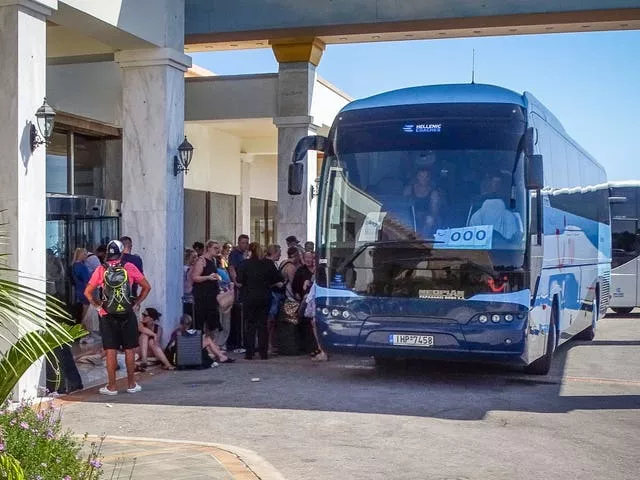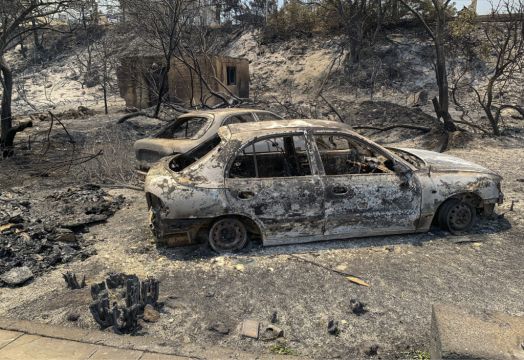Firefighters have struggled through the night to contain 82 wildfires across Greece, 64 of which started on Sunday, the hottest day of the summer so far.
Their efforts were without the help of firefighting planes and helicopters, which do not operate at night.
The most serious fire was on the island of Rhodes.
Some 19,000 people had been evacuated from several locations on the island as wildfires burned for a sixth day, Greek authorities said.
No further evacuations had been ordered as of Sunday night.

The Ministry of Climate Change and Civil Protection said it was “the largest evacuation from a wildfire in the country”.
Local police said 16,000 people were evacuated by land and 3,000 by sea from 12 villages and several hotels.
Six people were briefly treated at a hospital for respiratory problems.
A person who fell and broke a leg during a hotel evacuation and a pregnant woman remained in hospital, the latter in good condition, authorities said.
A number of tourists were waiting to fly back home from Rhodes International Airport.
The package holiday companies TUI and Jet2 cancelled flights to Rhodes.

But the Ministry of Infrastructure and Transport later said 14 TUI and Jet2 flights carrying 2,700 passengers would depart from Rhodes airport by 3am on Monday (12am GMT).
On Saturday and early on Sunday, 70,000 passengers travelled through the airport, with some being arrivals, the ministry said.
The announcement did not break down the figures by arrivals and departures.
British tourist Kevin Evans was evacuated twice on Saturday with his wife and three young children — first from Kiotari to Gennadi, then as the fire approached the island’s capital in the northeast, he told the PA news agency.
“There were lots of people in Gennadi sent from the hotels — many in just swimsuits having been told to leave everything in the hotel,” he told PA.
“As night fell, we could see the fire on the top of the hills in Kiotari. They said all the hotels were on fire.”
Rhodes travel agent Stelios Kotiadis told the Associated Press the evacuation was hasty.

“There was panic. … The authorities were overwhelmed,” he said.
But, he said, the abandoned hotels “are in much better condition than reported in social media. … They will be ready to reopen very soon if Civil Protection gives the go-ahead”.
Mr Kotiadis said he and other travel agents sent buses to the island’s southeast to pick up evacuated tourists.
They had to go the long way around because the road running down Rhodes’ eastern side was blocked in places.
“There were 80 to 90 people cramming into 50-seater buses,” he said.
He added that 90% of the evacuated tourists are from European countries.
The British ambassador to Greece, Matthew Lodge, said the UK Government was sending a rapid deployment team to support British nationals on Rhodes.
The Greek Ministry of Foreign Affairs said personnel had set up a help desk at Rhodes International Airport for visitors who have lost their travel documents.

There are substantial reinforcements from the European Union.
“Over 450 firefighters and seven airplanes from the EU have been operating in Greece as fires sprout across the country,” EU Commissioner for Humanitarian Aid and Crisis Management Janez Lenarcic tweeted early on Sunday afternoon.
“I called (Greek Prime Minister Kyriakos Mitsotakis) to express our full support for Greece, which is confronted with devastating forest fires and a heavy heat wave due to climate change. Greece is handling this difficult situation with professionalism, putting emphasis on safely evacuating thousands of tourists, and can always count on European solidarity,” European Commission president Ursula von der Leyen tweeted on Sunday evening.
The weather remained hot in the Mediterranean country on Sunday.
A total of 180 locations experienced temperatures of 40C and above.
The highest reading, 46.4C, was reached at the seaside town of Gytheio in southern Greece.
Of the 64 wildfires that broke out elsewhere in the country on Sunday, the most serious was on Evia, Greece’s second-largest island, where authorities told residents of four southern villages to evacuate to the town of Karystos, west of where the fire was advancing.
Central Greece vice governor Giorgos Kelaiditis, who was near one of the villages, told state agency ANA-MPA the situation is difficult.

“The fire may be two kilometres (1.25 miles) away, but the wind is strong, the growth is low, the smoke thick and the air is hard to breathe,” he said.
Northern Evia was devastated by wildfires in August 2021.
Other fires requiring evacuations broke out on the northeast side of the island of Corfu and in the northern Peloponnese, near the town of Aigio.
Traffic on the old Athens-Patras national road, running across the coast, has been cut off.
Just before midnight, authorities called for more evacuations from Corfu and the northern Peloponnese.
In the case of Corfu, they said the fire was “moving southeast on a broad front” and private vessels were on standby to pick up evacuees.

A fire that broke out west of the important archaeological site of Epidaurus, including a famous ancient theatre, has been partly contained, the fire service said.
A relative respite from the heat on Monday, with highs of 38C forecast, will be followed by yet more high temperatures starting on Tuesday.
But it should get significantly cooler on Thursday, with temperatures in the low to mid-30s, the country’s meteorological service said on Sunday evening.







